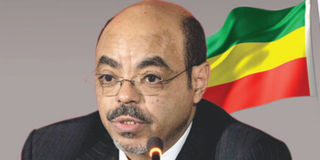What loss of Ethiopia PM means to Kenya and the region

Photo|FILE
World leaders mourned the death of Ethiopian Prime Minister Meles Zenawi with high praise after the strongman's more than two decades in power and despite a chequered human rights' record August 21, 2012
What you need to know:
- Widely regarded as highly intelligent, articulate and with an excellent grasp of complex policy issues, Mr Meles helped raise Ethiopia’s regional and international profile.
- The country will remain a key player in the regional “axis of moderates” engaged in the battle against the extremist Somali Islamist movement Al-Shabaab.
- Kenya and Ethiopia have a similar outlook and share the same concerns about Somalia.
The death of Ethiopian Prime Minister Meles Zenawi has thrown the Horn of Africa nation into a period of deep uncertainty.
The death has profound regional implications, especially for Kenya and Somalia. Many leaders are expressing fears the death may have serious repercussions for peace and stability in the region.
Concern has been mounting in Nairobi and Mogadishu since reports emerged four weeks ago that the Ethiopian leader was critically ill in a Belgian hospital.
That concern has now turned into anxiety, judging from the initial reaction.
Widely regarded as highly intelligent, articulate and with an excellent grasp of complex policy issues, Mr Meles helped raise Ethiopia’s regional and international profile.
In Kenya, he was mourned as an African leader whose “pragmatic and visionary” leadership was instrumental in the efforts to stabilize Somalia and Sudan and to contain Eritrea.
His death does certainly create new complications for regional governments. However, it is unlikely to cause a huge geopolitical upset.
The country will remain a key player in the regional “axis of moderates” engaged in the battle against the extremist Somali Islamist movement Al-Shabaab.
But his departure could intensify inter-state rivalry between the ambitious new players in Somalia, especially Kenya and Uganda. Al-Shabaab has issued a statement saying the death of the Ethiopian strongman could cause a collapse of the regional military alliance.
This, however, could be wishful thinking, for in Ethiopia the military incursions in Somalia enjoy broad support. With close to 10,000 troops stationed in south-central Somalia, the Ethiopian military is likely to play a crucial role in the battle to take control of Kismayu.
While it is true Ethiopia has no desire for a lengthy stay in Somalia, it recognises it cannot leave the job half-done. For that reason, Addis Ababa’s military support for the Amisom troops will continue, no matter who is in charge.
Kenya and Ethiopia have a similar outlook and share the same concerns about Somalia. There have been differences in the last two years over a number of issues, especially the plan to create Jubba land in southern Somalia.
But these differences are unlikely to undermine the overall strategic partnership – the most remarkable and enduring in the Horn. The two countries have also been instrumental in the efforts to stabilize South Sudan.
There have been efforts in Addis Ababa recently to find a permanent solution to a number of issues that have pushed the two Sudans to the brink of war.
Mr Meles was involved in these negotiations and his absence will no doubt be felt. But it is unlikely this fact alone could undermine the talks.
The writer is the religious editor at Nation Media Group




